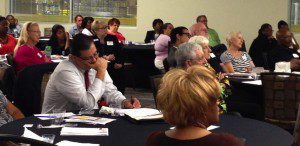
More than 75 participants from non-profit and faith-based organizations that help feed Orlando’s hungry senior citizens, Orlando Mayor Dyer’s Committee on Aging, Second Harvest Food Bank of Central Florida and AARP, gathered Tuesday, to discuss the growing issue of senior hunger in the City of Orlando.
The first-ever Summit on Senior Hunger was informed that, about 12,000 seniors in Orlando alone face hunger daily, notwithstanding the heroic efforts of organizations like Seniors First and Senior Life Solutions which attempt to meet the increasing number of seniors that are going hungry.
Participants learned too that, state-wide, the picture is equally depressing. Florida is one of the top 10 states with the highest numbers of seniors facing the threat of hunger with close to 700,000 seniors suffering from food insecurity.
Dave Krepcho, President and CEO of Second Harvest Food Bank of Central Florida says, the situation is pretty hopeless, when viewed against the backdrop of declining federal funding.
“We see a declining trend of government funding as the population of seniors is increasing dramatically, along with the need,” he said. “So those opposing trends are pretty scary.”
Despite the growing number of seniors that suffer from food insecurity, a majority do not access programs from which they could benefit, with a mere 20-30 percent taking advantage of the federal government’s Supplemental Nutrition Assistance Program (SNAP) or food stamp program. Presenters offered a variety of reasons as to why seniors are not benefiting from such programs including, being unaware of eligibility, perceived stigma, lack of knowledge regarding the application process and belief that others more in need are being deprived, among others.
Nitza Colon, SNAP Benefits Coordinator, Second Harvest Food Bank said, the older adults which are most at risk for hunger are those living at or below the poverty level, young seniors, minorities, those living alone, seniors raising a grand child, renters and the less educated.
“The number of seniors at or below the poverty line will increase as more Baby Boomers reach retirement,” she said. “And the younger Baby Boomers will be affected more.”
Summit participants discussed a variety of issues including, proper identification of seniors who suffer from food insecurity; access to and assistance with applying for food programs; better coordination among food groups; outreach to homeless seniors who face hunger and support for seniors living just above the poverty level.
With the number of seniors expected to double nationally by 2030 and food insecurity projected to increase by 50 percent, Krepcho believes that meeting basic needs such as hunger must be treated with priority. Any lasting solution, he says, will entail all groups contributing to rolling back this silent epidemic.
“Closing the gap for those in need will only come from all groups – government, non-profits, businesses, faith-based, and private citizens – having a seat at the table and devising realistic, sustainable solutions for hunger and senior hunger,” he said.
Today’s Summit was attended by other food groups including, Senior Intervention Group of Lake Mary, Mt. Sinai Seventh-day Adventist Church and Parramore Community Garden. A follow-up meeting is planned later this month, to develop concrete action steps that could be undertaken to help address the growing senior hunger problem in Orlando.


